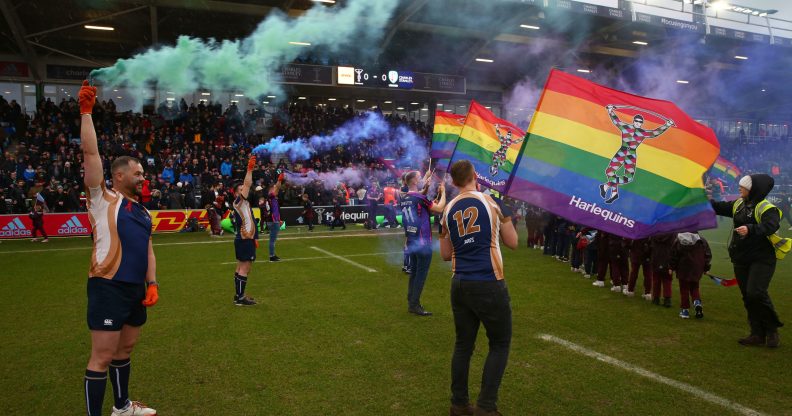LGBT acceptance in rugby just had its best and worst weekend, with two different games being played 1,000km apart

General view of the pre-match celebrations prior to the Gallagher Premiership Rugby match between Harlequins and London Irish at on February 15, 2020 in London, England. (Steve Bardens/Getty Images for Harlequins)
On the same day that disgraced homophobic rugby star Israel Folau made his debut for Catalns Dragons, English rugby union team Harlequins held a Pride day to celebrate LGBT+ folk in sports.
Jack Duncan, a long-term fan of the game and co-founder of Blank Canvas, wrote for PinkNews about what it means to be a gay rugby fan.
I knew I was gay from a young age, about 12 years old, which happens to be around the time I fell in love with rugby.
As you might expect, being a young gay lad in such an undeniably macho environment wasn’t easy.
Homophobic slurs were commonplace, even one or two the teachers at school were known to call us ‘sissies’ if we made a mistake.
I could never picture a rugby premiership team standing up for LGBT+ people.
Looking back, I blame that environment for holding myself back and never reaching my full potential. “What If they find out I like guys and tell me to leave the changing room,” was a regular thought.
Another was the painful realisation that none of my heroes were out and proud. I used to wonder if they’d hate me if they knew my secret.
If someone had told me back then, just 15 years ago, that a premiership rugby club would dedicate a regular season match to celebrating LGBTQ inclusion in sport, I’d have laughed.
It was a pipe dream.
But that dream became a reality on Saturday when Harlequins designated their premiership home match against London Irish as a “Pride-themed fixture” – becoming the first professional rugby club in the world to do so.
This was made all the more momentous for me by the fact that Quins happens to be the club I support and hold a season ticket with.
As a wider part of the initiative, Quins would host a pre-match LGBTQ discussion panel with queer personalities from across the sporting world.
They’ve also part-funded research into homophobic language in sport, in partnership with Australia’s Monash University.
Harlequins and fans make powerful stand for LGBT+ rights and, of course, ABBA.
On the day itself, we arrived at “the Stoop” early to get the beers in as usual; but it was clear from the off that this was no ordinary game day.
Players from the LGBTQ inclusive Kings Cross Steelers were handing out Pride flags while throwing shapes to Cher’s “Believe”, which was being blasted out over the stadium speaker system.
The Stoop was camp, and I was here for it.
Inside, kids were queuing to get their faces painted with the Quins badge on one cheek, the Pride flag on the other. I followed suit, as did my straight best mate – which meant more to me than he’ll ever realise.

Harlequins take to the field during the Gallagher Premiership Rugby match between Harlequins and London Irish at The Stoop. (Alex Davidson/Getty Images)
Meanwhile, representatives from Stonewall were taking questions and the Quins players that were left out of the match day squad strutted around in pride t-shirts, taking photos with fans.
Was this real!?
Outside, the players were warming up as usual, but to a not-so-usual backing track of “Dancing Queen” by ABBA. My life was complete.
I’d long wished for a day like this – the meeting of my two worlds, but I never thought it would go this well.
Inclusion was being embraced. I saw parents encouraging their kids to grab a pride flag while enthusiastically waving their own.
There were no funny looks here, no slurs, nothing – just a major sports team and its fans making a stand for LGBTQ rights.
Yes, really.
Not even a storm and a scoreline could tamper the Harlequins Pride day.
Before the match, we were treated to yet another take on rainbows, this time in the form of fireworks and coloured smoke; while fans roared the players onto the pitch through a sea of giant Pride flags.
Sadly, Storm Dennis was blowing hard, and the rugby suffered – London Irish eventually ran out deserved 29-15 winners.
But neither the weather nor the scoreline could dampen what was an incredibly moving and important day.

(Bob Bradford – CameraSport via Getty Images)
The occasion was made all the more poignant when you contrast it to what was happening at the exact same time 1,000km away in Perpignan – where unrepentant anti-gay Israel Folau, who believes ‘hell awaits’ queer people, was marking his controversial debut for Catalan Dragons by scoring a try.
No, there was no ABBA on the loudspeakers here, certainly no rainbow smoke – and the only pride flags present, brought in by two travelling Castleford fans, were taken away by club stewards.
LGBTQ rights in rugby concurrently had its best and worst weekend. One club, Harlequins, showing the world of sport, not just rugby, exactly how it’s done.
Catalan Dragons on the other hand reminded us just how fragile respect for the LGBTQ community remains in the darker corners of professional sport.
The events in Perpignan mustn’t be allowed to overshadow what happened in southwest London.
This felt important. It was an unapologetic, full throttle, display of unity with LGBTQ people.
It was the realisation of a personal dream for me, and a watershed moment for queer rights in sport.
Bravo Quins, now it’s up to the rest to follow suit.

